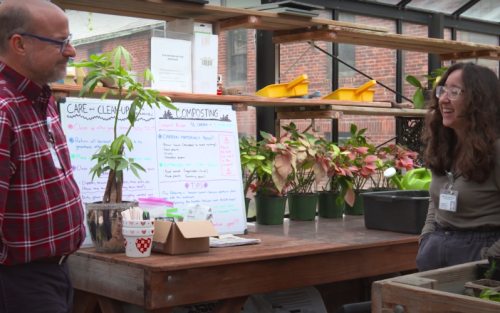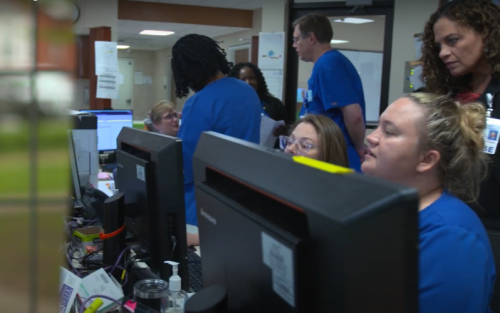






Hartford HealthCare Institute of Living - Main Campus
Treatment Focus
At this center, you receive personalized care for mental health conditions. They provide therapy and tailor treatment to your unique needs, diagnoses, and preferences.
Primary Level of Care
Offering intensive care with 24/7 monitoring, residential treatment is typically 30 days and can cover multiple levels of care. Length can range from 14 to 90 days typically.
This provider hasn't verified their profile's information. Are you the owner of this center? Claim your listing to better manage your presence on Recovery.com.
Treatment Focus
At this center, you receive personalized care for mental health conditions. They provide therapy and tailor treatment to your unique needs, diagnoses, and preferences.
Primary Level of Care
Offering intensive care with 24/7 monitoring, residential treatment is typically 30 days and can cover multiple levels of care. Length can range from 14 to 90 days typically.
Provider's Policy
We provide a price estimator tool and our list of charges to help you understand charges and potential out-of-pocket expenses for select services. You can access this tool either by logging into your MyChartPlus account or by using our guest estimates feature.
Hartford HealthCare Institute of Living - Main Campus
Hartford HealthCare Institute of Living - Main Campus
About Hartford HealthCare Institute of Living - Main Campus
The Institute of Living (IOL), part of Hartford HealthCare, provides care to adolescents and adults in Connecticut experiencing mental health disorders, including anxiety disorders, mood disorders, psychotic disorders, and co-occurring substance use disorders. Some of the anxiety disorders they treat are generalized anxiety disorder (GAD), hoarding disorder, illness anxiety, obsessive compulsive disorder, post-traumatic stress disorder, panic disorder, school refusal, separation anxiety disorder, social anxiety disorder, phobias, hair-pulling, and skin-picking disorder.
They provide treatment notes during and after care with the MyChart app or website.
How They Treat
IOL has residential, day, intensive outpatient (IOP), and standard outpatient care tracks. Their care tracks all use evidence-based and medical approaches, including cognitive-behavioral therapy (CBT) and dialectical behavior therapy (DBT), and medication-assisted treatment (MAT), along with many group therapy programs. Something that sets IOL apart is its integration of clinical care, education, and research, since it's part of an academic hospital.
IOL uses life experience groups and general groups. Some general groups are social skill building, anger management, adventure-based counseling, expressive arts, art therapy, and sewing.
Who They Treat
Within the pool of adolescents and adults who IOL treats, they offer specialized treatments for specific groups. For adults 55+, their geropsychiatriatrists can address aging-related issues like sleep disorders, dementia, and life changes that affect mental health and substance use. For clients with autism, especially children and adolescents with autism, they can provide treatment that helps with independent living skills, speech-language pathology, social skills, and other considerations that affect mental health. For young adults 18-26, the young adults services (YAS) program specializes in helping young adults overcome mental health challenges to be independent. For LGBTQ+ clients, especially those 18-26, IOL provides affirming care to in their right track program to manage stress and stigma, strengthen family connections, utilize personal strengths, and develop coping skills. For expecting and nursing mothers and fathers, the peripartum mood disorders program helps clients when they sense that something isn't right with their mental health while parenting. For clients 11-14, the teaching our positive side (TOPS) day treatment program leads clients in experiential therapies to build social skills.
Where They Treat
The Institute of Living's main campus is in downtown Hartford, near the airport. They also have a branch campus for their Anxiety Disorders Center program, located 40 minutes away in Cheshire.
How Much for Treatment
IOL's therapy costs price estimates and care notes through MyChart. Generally, self-pay costs without insurance can range from $120-$360.

Center Overview
Treatment Focus
At this center, you receive personalized care for mental health conditions. They provide therapy and tailor treatment to your unique needs, diagnoses, and preferences.
Insurance Accepted
Cash Pay Rates
Estimated Cash Pay Rate
Center pricing can vary based on program and length of stay. Contact the center for more information. Recovery.com strives for price transparency so you can make an informed decision.
Levels of Care





Your Care Options
Specializations
Anxiety
Anxiety is a common mental health condition that can include excessive worry, panic attacks, physical tension, and increased blood pressure.
Schizophrenia
Schizophrenia is a serious mental health condition that causes hallucinations, delusions, and disordered thinking.
Young Adults Program
Programs for young adults bring teens 18+ together to discuss age-specific challenges, vocational and educational progress, and successes in treatment.
Older Adults
Addiction and mental health treatment caters to adults 55+ and the age-specific challenges that can come with recovery, wellness, and overall happiness.
Who We Treat
Men and Women
Men and women attend treatment for addiction in a co-ed setting, going to therapy groups together to share experiences, struggles, and successes.
Young Adults
Emerging adults ages 18-25 receive treatment catered to the unique challenges of early adulthood, like college, risky behaviors, and vocational struggles.
Adolescents
Teens receive the treatment they need for mental health disorders and addiction, with the added support of educational and vocational services.
Older Adults
Addiction and mental health treatment caters to adults 55+ and the age-specific challenges that can come with recovery, wellness, and overall happiness.
LGBTQ+
Addiction and mental illnesses in the LGBTQ+ community must be treated with an affirming, safe, and relevant approach, which many centers provide.
Pregnant Women
Addiction and mental health treatment meets the clinical and psychological needs of pregnant women, ensuring they receive optimal care in all areas.
Approaches
Evidence-Based
A combination of scientifically rooted therapies and treatments make up evidence-based care, defined by their measured and proven results.
Individual Treatment
Individual care meets the needs of each patient, using personalized treatment to provide them the most relevant care and greatest chance of success.
Therapies
1-on-1 Counseling
Patient and therapist meet 1-on-1 to work through difficult emotions and behavioral challenges in a personal, private setting.
Acceptance and Commitment Therapy (ACT)
This cognitive behavioral therapy teaches patients to accept challenging feelings and make the appropriate changes to reach personal goals.
Art Therapy
Visual art invites patients to examine the emotions within their work, focusing on the process of creativity and its gentle therapeutic power.
Nutrition Counseling
Nutritious food helps patients heal from within, setting them up for mental and bodily wellness as they learn about healthy eating.
Experiential Therapy
With this approach, patients heal by doing. Therapists help patients process difficult emotions to speak, using guided activities like art or dance.
Horticultural Therapy
Gardening can be both meditative and inspiring. This therapy encourages social, emotional, and physical recovery.
Expressive Arts
Creative processes like art, writing, or dance use inner creative desires to help boost confidence, emotional growth, and initiate change.
Conditions We Treat
Anxiety
Anxiety is a common mental health condition that can include excessive worry, panic attacks, physical tension, and increased blood pressure.
Depression
Symptoms of depression may include fatigue, a sense of numbness, and loss of interest in activities. This condition can range from mild to severe.
Schizophrenia
Schizophrenia is a serious mental health condition that causes hallucinations, delusions, and disordered thinking.
Grief and Loss
Grief is a natural reaction to loss, but severe grief can interfere with your ability to function. You can get treatment for this condition.
Suicidality
With suicidality, a person fantasizes about suicide, or makes a plan to carry it out. This is a serious mental health symptom.
Personality Disorders
Personality disorders destabilize the way a person thinks, feels, and behaves. If untreated, they can undermine relationships and lead to severe distress.
Eating Disorders
An eating disorder is a long-term pattern of unhealthy behavior relating to food. Most people with eating disorders have a distorted self-image.
Substances We Treat
Drug Addiction
Drug addiction is the excessive and repetitive use of substances, despite harmful consequences to a person's life, health, and relationships.
Opioids
Opioids produce pain-relief and euphoria, which can lead to addiction. This class of drugs includes prescribed medication and the illegal drug heroin.
Alcohol
Using alcohol as a coping mechanism, or drinking excessively throughout the week, signals an alcohol use disorder.
Languages
Care Designed for Your Needs
Personal Amenities
Special Considerations
Young Adults Program
Programs for young adults bring teens 18+ together to discuss age-specific challenges, vocational and educational progress, and successes in treatment.
Couples program
Using gentle clinical care, therapists guide patients and their partner through guided sessions to address issues and work towards lasting solutions.





